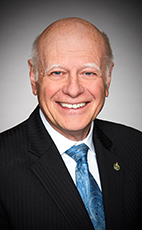M-76 Citizens' Assembly on Electoral Reform
44th Parliament, 1st Session
Motion Text
(a) the House recognize that,
(i) representative democracy is a fundamental part of Canadian society,
(ii) in Canada’s current electoral system, the majority of voters cast ballots for a candidate who does not get elected, and many voters feel that election results do not accurately reflect their views,
(iii) many Canadians are concerned with the health of Canada’s democracy, including voter distrust and disengagement, low voter turnout, and the polarization of politics,
(iv) all politicians, and all parties, are widely perceived by the public to have a vested interest in the design of the electoral system,
(v) citizens' assemblies have considerable legitimacy and public trust because they are independent, non-partisan, representative bodies of citizens,
(vi) citizens’ assemblies have been used successfully in Canada, Australia, Belgium, France, Ireland, Scotland, the Netherlands, and the United Kingdom to tackle difficult issues through nuanced public deliberation,
(vii) a citizens' assembly on electoral reform would give citizens a leadership role in building consensus on a specific model for electoral reform for Canada; and
(b) in the opinion of the House, the government should create a Canadian citizens’ assembly on electoral reform, which would,
(i) consist of citizens selected by sortition, an impartial selection process to ensure the Assembly’s independence and non-partisanship,
(ii) reflect the diversity of the Canadian population, including a representation of age groups, genders, ethnicities, languages, socioeconomic backgrounds, and geographic regions, along with meaningful participation from First Nations, Inuit and Metis peoples,
(iii) determine if electoral reform is recommended for Canada, and if so, recommend specific measures that would foster a healthier democracy.
Latest Activity
- Monday, January 30, 2023
- Placed on Notice
History
- Monday, January 30, 2023
-
Placed on Notice
Joint Seconders (18)
Jointly seconding a private Member's motion is a formal way for up to 20 Members to show support for the motion before it is called for debate. They are displayed in the order they were received by the Clerk of the House.
Jointly seconded on Thursday, February 2, 2023

Jointly seconded on Friday, February 10, 2023

Jointly seconded on Tuesday, February 14, 2023


Jointly seconded on Thursday, February 23, 2023

Jointly seconded on Monday, February 27, 2023

Jointly seconded on Tuesday, March 7, 2023

Jointly seconded on Tuesday, March 28, 2023


Jointly seconded on Thursday, March 30, 2023

Jointly seconded on Monday, April 3, 2023


Jointly seconded on Wednesday, April 12, 2023

Jointly seconded on Wednesday, April 19, 2023

Jointly seconded on Tuesday, April 25, 2023



Jointly seconded on Thursday, April 27, 2023

